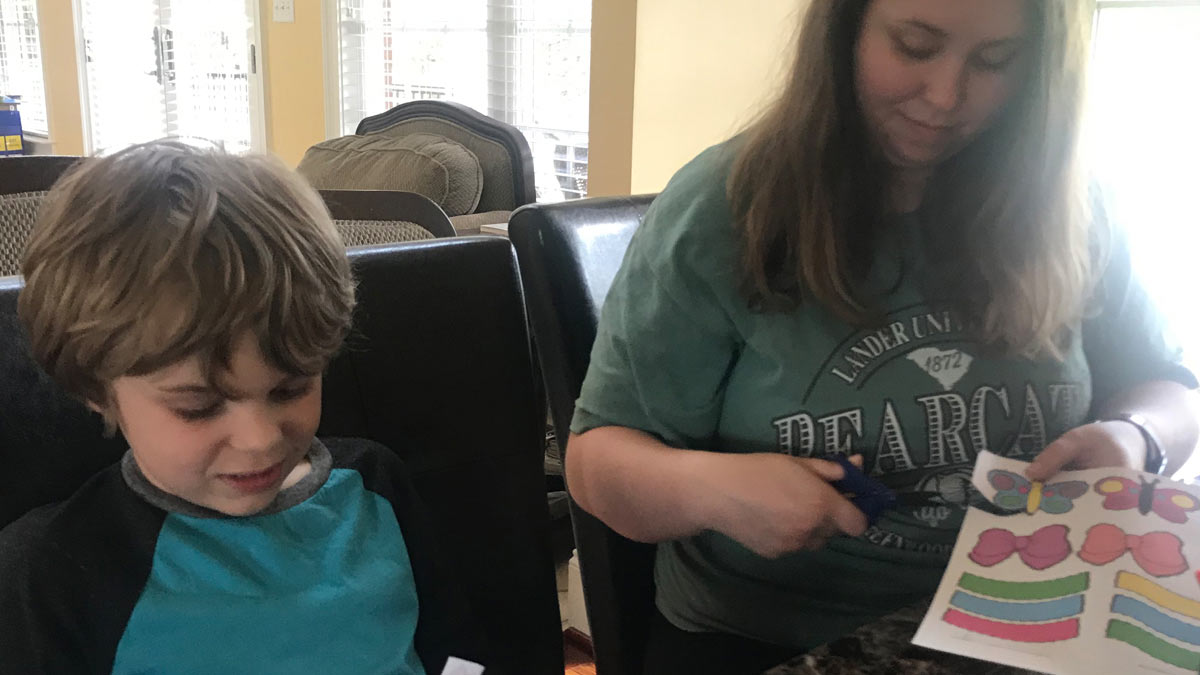On a normal school day, Amber Kneece spends four hours in the car taking her 7-year-old son, Coby, back and forth to school and therapy. That driving time represents a commitment to get her son the best possible education available. Is he attending a charter school, a private academy or a prep school? No.
Coby divides his day between a regular public school setting and therapy at the Greenwood campus of Project HOPE Foundation. Why? Because Coby has autism and needs highly specialized education.
Amber said the long drive is well worth her time and expense. Since discovering Project HOPE three and a half years ago, Coby’s communication and socialization skills have significantly improved, and she said the progress has been “amazing.” She becomes emotional now at the thought of reopening long-shuttered windows of hope for his future.
Because of COVID-19, it’s been a while since Amber and Coby have experienced a normal day. They no longer make the long commute to Greenwood. Instead, five days a week, a Project HOPE therapist travels to their home to spend seven hours working one-on-one with Coby. Additionally, a therapist supervisor observes the learning sessions and offers support via live video connection. This is the kind of individualized commitment and determination this organization offers its clients.
Project HOPE Foundation works to provide “a lifespan of services for the autistic community,” which currently includes more than 200 families. To wrap comprehensive services around the needs of such an age-diverse population requires a variety of creative responses. Multiple campuses across the Upstate offer both educational settings and therapy clinics:
- One tier of Project Hope Foundation’s school program, where children “love to learn … and learn to live,” offers full-day classes with specialized teachers and small teacher-student ratios in classroom settings.
- Another tier of programming offers intensive one-on-one therapy for nonverbal school-age clients. Applied behavior analysis therapists incorporate iPads and other technology to assist their students.
- A program for adults focuses on socialization, life skills and employment options.
- Project HOPE’s therapy program makes individual sessions in clinical settings available, teaching life-changing skills to 220 children.
“Printed by HOPE” is a small-scale digital shirt-printing business, created to teach marketable skills to adults with autism while also raising funds for the Foundation.
Like the rest of the country, Project HOPE Foundation is making major adjustments to its daily schedules and programming. According to Lisa Lane, co-founder and shared executive director with Susan Sachs, “Unfortunately, the autistic community is disproportionately impacted by situations that involve change to routine. However, because we provide medically necessary services, we are categorized as an essential organization.”
Accommodating recommended health precautions has required temporarily redesigning some of their client services to address these increased needs.
“We have been able to move some of our students to e-learning and to provide one-on-one home therapists for others. Our adults receive therapy remotely, via video conferencing, travel between campuses has been curtailed and remote options have been adapted wherever possible,” Lane said.
While Project HOPE Foundation remains firmly committed to providing essential services to the autism community and their families, every “not-normal” day has meant less public and private funding, fewer sessions and less client billing, as well as fewer donations and fundraising projects. For example, the group’s annual Evening of Hope fundraiser has been postponed from its May date to Oct. 9, 2020. Typically, this spring event brings in more than $1 million that must be privately raised to sustain operations.
While awaiting the return of normal days, Project HOPE Foundation could benefit greatly from your financial gifts. October fundraising lies far out in the distance. Consider donating today or hiring Printed by Hope for your next T-shirt order.
For more information, call 864-476-7400 or visit www.projecthopesc.org.
By Janet E. Perrigo
